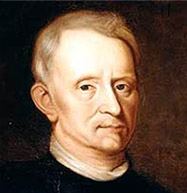 |
| Robert Hooke (1635-1703) |
The cell theory is the scientific theory that describes the properties of cells. Cells are the basic unit of structure in all organisms - they're also the basic unit of reproduction. Over the last few centuries, there's been continual improvements made to microscopes all the time. This has allowed us to look deep into the structure of the cell. Much of this is attributed to Robert Hooke who began the study of cells (cell biology). There's been many debates over the years about cells but now they're considered the fundamental unit of life. This discussion and research led to the Cell Theory being eventually formulated in 1838, which was credited to Matthias Schleiden and Theodor Schwann. But many other scientists like Rudolf Virchow contributed too.
The Cell Theory is widely accepted to be the foundation of biology and explains the function of the cells.
The main principles of the cell theory are described as:
- All living organisms are composed of at least one cell
- The cell is the most basic form of life
- All cells come from pre-existing cells

No comments:
Post a Comment